- The Wellness Tree1480 Beltress St, Suite 5
Dunedin, FL 34698727-216-6929 Call for appointments & information
- Testimonials
I went to get acupressure because I was past my pregnacy due date, but after the appointment I felt like I was walking on air. I had a lot of energy, my pains were gone, and I realized I needed it more than I really knew. She is understanding and very professional. I would definitely recommend Dr. Graves.
-S.S
Dr. Carrie Johnson is what all physicians should be–knowledgeable, concerned, and caring. She listened and worked with me as an individual. She took me from a life of fear of exacerbating the already constant pain to a life where I can be physically active because the pain can be eliminated by her skilled treatment. Not only did she provide healing with accupuncture to relieve TMJ and radiating nerve pain, she also taught me two simple exercises that extend the effect
... Read more »I am a sr citizen and have been going to Dr. Carrie for a year and am hooked on acupuncture!! She helped me with losing weight and lowering my blood pressure. A great way to stay well and maybe someday all insurance carriers will see to it to cover acupuncture as a medical treatment.
I am a fitness freak: I like cross-country running,cycling, weight lifting, playing basketball and racquetball. But at a certain point I started having severe back pains, spasms and hamstring tightening which sidelined me for quite a while as I tried physical therapy but I did not get immediate relief I was looking for. Then I visited with Dr Carrie Johnson for initial visit and analysis of my condition, at first I was skeptical but Dr Carrie Johnson made me a believer of Acupuncture and Active release techniques. Thanks
... Read more »Let me start by saying I am a certified CrossFit trainer with multiple specialty certifications and I am also a USAW certified Sport Performance Coach. I have dealt with minor injuries before but nothing that forced me to consider some type of rehab or treatment plan. While training high volume or a competition I suffered a low back injury. After months of rest and self prescribed rehab I wasn’t getting back to the shape I wanted and my symptoms persisted.
... Read more » -
Latest Articles:
- • Spring Clean Your Way to Better Health •
- • 5 Healthy Ways to Embrace the Spring Season •
- • Fun Things to do this Spring •
Nutrition
Foods for the Winter Season

Everybody knows that food is what gives our bodies the energy we need to survive. But not everybody is aware that certain foods should be consumed during specific times of the year. In areas like the Midwest, where fruits and vegetables are harder to keep on hand when the weather becomes colder, this principle is followed a little more closely. But in areas like Hawaii and Southern California, where fresh fruits and vegetables are always available and the climate is more moderate, people sometimes forget to eat according to the seasons. continue reading
Nutrition for Heart Health OM Nutrition & Hypertension
 Oriental medicine (OM) nutrition combines ancient wisdom with modern science. OM nutrition is a holistic approach, which aims to balance all five flavors within most meals with one or two flavors being emphasized for therapeutic purposes. OM nutrition for a hypertension emphasizes bitter flavors, sour flavors and energetically-cooling foods.
Oriental medicine (OM) nutrition combines ancient wisdom with modern science. OM nutrition is a holistic approach, which aims to balance all five flavors within most meals with one or two flavors being emphasized for therapeutic purposes. OM nutrition for a hypertension emphasizes bitter flavors, sour flavors and energetically-cooling foods.
OM theory states the bitter flavor benefits the heart in moderation but an excess is harmful as it has a drying effect; for example, coffee is bitter. In moderation coffee acts as vasodilator increasing circulation but in excess it can raise blood pressure and has a diuretic effect. Modern scientific research has discovered while the human genome has 25 bitter taste receptors 12 of these are expressed in the human heart. continue reading
6 Truths About the Not-so-sweet Side of Sugar
 A study published by the JAMA Internal Medicine found that more than 70 percent of Americans consume more than the recommended daily amount of sugar. Sadly, most of us are addicted to sugar, which happens to be hidden in most of the foods and drinks we consume. Added sugar can cause a whole array of problems that can be short term as well as long term. If you are experiencing health problems, lowering your sugar intake may be one of your best options. Below are 10 truths about the ugly side of sweets. continue reading
A study published by the JAMA Internal Medicine found that more than 70 percent of Americans consume more than the recommended daily amount of sugar. Sadly, most of us are addicted to sugar, which happens to be hidden in most of the foods and drinks we consume. Added sugar can cause a whole array of problems that can be short term as well as long term. If you are experiencing health problems, lowering your sugar intake may be one of your best options. Below are 10 truths about the ugly side of sweets. continue reading
Redefining my Relationship with Food – Guest Post
Redefining My Relationship with Food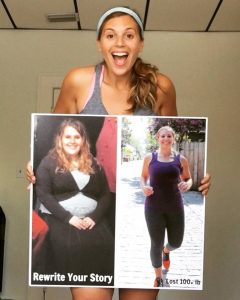
For as long as I can remember, I have had an unhealthy relationship with food. I developed habits of using food as a source of comfort and a way to cope with my emotions at a young age and allowed these behaviors to escalate over the years. The purpose of food in my life was not to nourish my body when I was feeling hungry, but rather to fill a void when I was feeling bored, sad, lonely, excited, happy, anxious, etc. When food is consumed for reasons other than hunger, it is very difficult to decide when to stop eating, and you quickly begin to feel like you have lost control. Overeating caused me physical and emotional discomfort, which resulted in a cyclic behavior of turning to food once again to numb those feelings.
By the age of 20, I found myself medically fitting under the category of “obese,” weighing in at almost 300 pounds. I would try so hard to follow strict diets, but eventually I would end up feeling deprived, and I would run back to all of the foods that I wasn’t allowed to have on my diet. The shame spiral I would go down in my head after overeating always had the same exact result: more overeating.
After 6 or 7 years of feeling lost in an extreme diet-binge-diet cycle, I managed to lose some of the weight, but I didn’t feel like I had found a sustainable solution. Food still had so much power over me and I sensed that there was something deeper than dieting that I needed to address if I was going to break this cycle.
This past year, I made a commitment to myself to get to the bottom of this. My intention was to permanently change my relationship with food and develop healthy eating behaviors. What I didn’t know at the time was that in order to change my relationship with food, I first needed to change my relationship with myself.
It turns out that true freedom comes from within, not from following the rules of a diet. When I began looking within, it became clear to me that I had allowed my excess body weight to completely define who I thought I was as a person in this world. I didn’t believe that I was worth loving and I didn’t even want to treat my body with respect. I decided to start looking closely at the stories I had created in my head throughout the years about who I thought I was and what I thought I deserved and began finding the strength to rewrite these stories. I faced my fears, took risks, and did all of the things that I always told myself that I couldn’t do. Eventually, I had enough evidence to fully support that my old stories were simply not factual and I slowly began believing in myself.
Through the development of self-love, I was able to learn how to respect and trust my body enough to actually listen to it. It turns out that I don’t need to count calories or track points to look and feel healthy because our bodies actually have a built-in signaling system that tells us when we’re hungry, full, what to eat, and when to eat it. All of the answers are inside of us; we just have to learn to listen.
Not only have I lost over 120 pounds and gone down 9 sizes in clothing, but I can confidently say that I have formed a sustainable positive relationship with food (and more importantly, with myself).
Here’s what this positive relationship looks like:
- I know why I’m eating when I eat. 98% of the time, I wait until my body gives me hunger signals before I choose to eat. If I have the urge to eat when I’m not hungry, I take it as an opportunity to figure out what is really going on and give myself what I need. For example, if I am craving ice cream, the first thing I do is check-in with my body to see if I’m hungry. If I’m not hungry, I ask myself how I’m feeling emotionally. Sometimes, I’m really just feeling exhausted when I want a treat. Now I address the problem directly, by allowing myself to rest when I’m feeling tired, rather than stuffing my feelings with food.
- When I am hungry, I take the time to really ask my body what it wants to eat. I say things to myself like, “Hey body, how are you feeling? What kind of food will make us feel alive and unstoppable today?” When considering my options, I visualize what my body will feel like after I eat the proposed meal. As long as my body gives me the green light, I’ll eat it. This means that some days toast feels like a good idea and other days, I prefer to be grain-free. I am not on a restrictive diet; I simply listen to my body and give it what it truly wants. My body always tells me what is best. When I consider having something like French toast or doughnuts for breakfast, my body reminds me of how it typically feels after eating things like that, and then the appeal is gone and I choose something my body will thrive off of instead. I love my body and I want it to feel good!
- I stick to real food. This is a full-time job of constantly reading labels and asking questions to ensure that what I’m eating is actual food. I was about to put some butter on my toast this morning at a restaurant, until I looked at the package and noticed that it was not butter. The product’s technical name was “whipped spread.” Hmm… The ingredients consisted of things like liquid and partially hydrogenated soybean oil, artificial flavor, and vegetable mono & diglycerides. Thanks, but no thanks. Now that I value my life, I like to know (and be able to pronounce) the things that I’m putting into my body. I want my body to be around for a long time, so I fill it with nutrient-dense foods that are found in nature, not in a chemistry lab.
- When I’m full, I stop eating. This has been the hardest behavior to master. Sometimes I have to remind myself that food isn’t the only form of excitement in my life anymore. Now that I have interests, hobbies, a social life, and things I’m passionate about, I’m too busy to obsess about food. Stopping when I’m full, even if what I’m eating is delicious, is a way of reinforcing the message that I love myself and food no longer controls my life.
- When I eat too much or something unhealthy, I give myself a hug, and I move on. Immediately after a situation like this, thoughts of failure and fear flood my mind. I worry that I’m going to lose control and get right back into a vicious cycle. But now that I’m on my team and like myself, a stronger me jumps in and shuts those thoughts down. Sometimes I have to bring down the hammer 50 times, but I don’t give up. In reality, usually all that has actually happened is that I have given myself a stomachache and I feel bloated. I now understand that these uncomfortable feelings will go away and that I do not need to define my self-worth based on the food choices I make. When I find myself in this place, I drink tons of water, go for long walks, and I give myself extra love and compassion. I already know where judging myself will get me, and I’m not about that life anymore!
M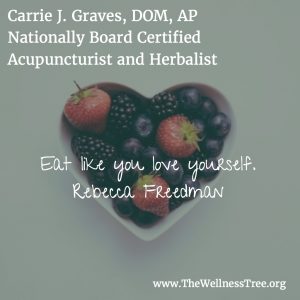 y relationship with food was developed through years of trial and error and truly getting to know my body. Every body is different. We each have the ability to take the time to get to know our bodies and gather our own data about what feels good and what doesn’t. The human body is not static. The foods that feel good to us today may not feel good tomorrow, and that’s okay. Eating thoughtfully and listening to our bodies requires patience and effort, but I can’t think of anything more important to invest in than my health!
y relationship with food was developed through years of trial and error and truly getting to know my body. Every body is different. We each have the ability to take the time to get to know our bodies and gather our own data about what feels good and what doesn’t. The human body is not static. The foods that feel good to us today may not feel good tomorrow, and that’s okay. Eating thoughtfully and listening to our bodies requires patience and effort, but I can’t think of anything more important to invest in than my health!
Ways to Keep Your Memory Sharp
Don’t forget about physical exercise
Believe it or not, when you’re exercising your body, you’re exercising your mind as well. Aerobic exercise gets your blood pumping, which increases the oxygen going to your brain and lowers your risk of disorders such as diabetes and cardiovascular disease that can lead to memory loss. If you can, start with some exercise in the morning. This can clear your head right off the bat to stay focused and alert during the day. Exercises that require coordination are especially helpful for keeping the mind active such as simply throwing a ball back and forth. continue reading
7 Superfoods That Can Change Your Life
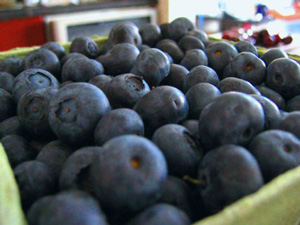 You are what you eat is an adage that holds more truth than you may realize. Unfortunately, many people today focus their diet around processed foods that are high in sugar, sodium and fat. Diets such as this can increase a person’s risk of developing diabetes, heart disease, obesity, and more. You can protect your body and health against such illnesses, however, by eating lean meats, fresh vegetables, and by adding the following “superfoods” to your diet.
You are what you eat is an adage that holds more truth than you may realize. Unfortunately, many people today focus their diet around processed foods that are high in sugar, sodium and fat. Diets such as this can increase a person’s risk of developing diabetes, heart disease, obesity, and more. You can protect your body and health against such illnesses, however, by eating lean meats, fresh vegetables, and by adding the following “superfoods” to your diet.
#1) Broccoli
This edible stalky plant of the cabbage family is loaded in potassium, vitamin B-6, vitamin C magnesium, and calcium. Scientists believes broccoli’s phytochemicals – organic chemical compounds which occur naturally – are able to aid in skin health, regulate blood sugar levels, strengthen the immune system, and ward off joint inflammation. continue reading
How To Dine Out If You Have a Food Allergy
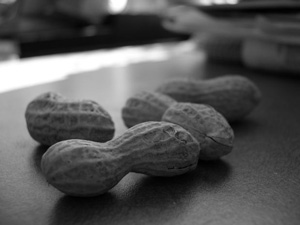 Food allergies shouldn’t prevent you from dining out with your friends and family. Unfortunately, though, many people with food allergies resort to cooking their own meals to reduce the risk of an adverse reaction. From dairy and nuts to gluten (wheat-based protein) and shellfish, there are certain foods that people must avoid to prevent adverse reactions. continue reading
Food allergies shouldn’t prevent you from dining out with your friends and family. Unfortunately, though, many people with food allergies resort to cooking their own meals to reduce the risk of an adverse reaction. From dairy and nuts to gluten (wheat-based protein) and shellfish, there are certain foods that people must avoid to prevent adverse reactions. continue reading
Top Tips for Cardiac Health
The CDC lists the No. 1 killer of men in America as heart disease. Statistics show that 1 in 4 men over 40 will suffer from a cardiac event at some point in their life. Knowing how to prevent heart disease is just as important as knowing the signs of a cardiac event.
Prevention, It’s the Best Medicine
1. 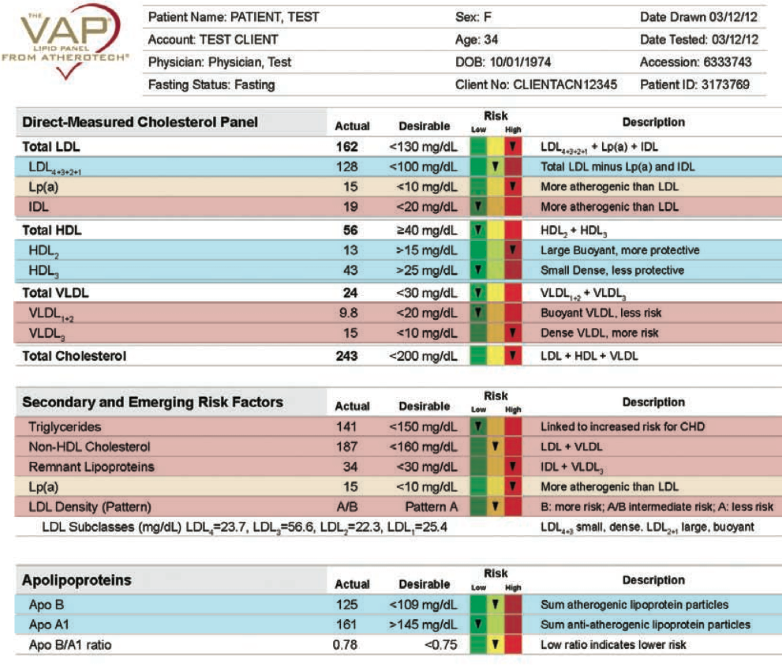 Routine Exams. Work with your physician to monitor your cholesterol, your blood pressure, and your inflammatory markers. I recommend working with Laboratory companies like Atherotech to check lipids. Basic lipid panels (BLPs) are inaccurate and inadequate at assessing residual risk in all patient
Routine Exams. Work with your physician to monitor your cholesterol, your blood pressure, and your inflammatory markers. I recommend working with Laboratory companies like Atherotech to check lipids. Basic lipid panels (BLPs) are inaccurate and inadequate at assessing residual risk in all patient
- 50% of patients hospitalized with coronary artery disease had “normal” cholesterol according to traditional lipid panels
- Patients with diabetes are at increased risk for MI, stroke, amputation, and death
- Diabetes causes metabolic abnormalities that induce vascular dysfunction, which predisposes this population to atherosclerosis
 Diet. A heart healthy diet is something that we’ve been chasing for decades within our country. The truth in the research is that the best food is real, unprocessed, and natural. Eating grassed, organic meats, seasonal vegetables, and local fruits will keep your body healthy and balanced. The inflammation that comes from processed foods directly impacts coronary health
Diet. A heart healthy diet is something that we’ve been chasing for decades within our country. The truth in the research is that the best food is real, unprocessed, and natural. Eating grassed, organic meats, seasonal vegetables, and local fruits will keep your body healthy and balanced. The inflammation that comes from processed foods directly impacts coronary health Exercise. We all know we need to exercise more. Changing little habits to make our sedentary lives more active will have a profound effect on your cardiac health. Try to incorporate 3-4 hours a week of walking, jogging, biking, and weight training into your routine. Walking for 15 minutes every lunch break will easily chip away at that goal of 4 hours of added exercise a week.
Exercise. We all know we need to exercise more. Changing little habits to make our sedentary lives more active will have a profound effect on your cardiac health. Try to incorporate 3-4 hours a week of walking, jogging, biking, and weight training into your routine. Walking for 15 minutes every lunch break will easily chip away at that goal of 4 hours of added exercise a week.
 5. De-Stress.
5. De-Stress. Quality sleep goes a long way in disease prevention and rehabilitation. Shooting for 8 uninterrupted hours of sleep is great goal though there isn’t a magic number for everyone. Sleep requirements vary based on age, disease, stress, and activity levels. Paying attention to your body and having good sleep habits are important in health and wellness.
Quality sleep goes a long way in disease prevention and rehabilitation. Shooting for 8 uninterrupted hours of sleep is great goal though there isn’t a magic number for everyone. Sleep requirements vary based on age, disease, stress, and activity levels. Paying attention to your body and having good sleep habits are important in health and wellness.Healthy Snacks: Eating Kiwis Can Make You Feel Better
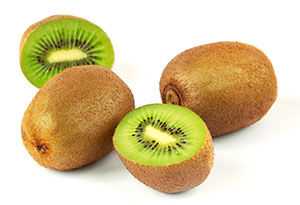 The results of a recent study conducted at the University of Otago, in New Zealand, indicate that eating kiwifruit can make one feel better. This is accomplished in two ways: energy is increased and mood is improved. Over a period of six weeks, 54 young and healthy university students consumed kiwis on a daily basis. The study participants were split into two groups. The men in one group ate only half a kiwifruit each day, while everyone in the other group ate two kiwis per day. The researchers concluded that those who ate two kiwis per day experienced less fatigue (due to increased energy) and less depression than the other group. continue reading
The results of a recent study conducted at the University of Otago, in New Zealand, indicate that eating kiwifruit can make one feel better. This is accomplished in two ways: energy is increased and mood is improved. Over a period of six weeks, 54 young and healthy university students consumed kiwis on a daily basis. The study participants were split into two groups. The men in one group ate only half a kiwifruit each day, while everyone in the other group ate two kiwis per day. The researchers concluded that those who ate two kiwis per day experienced less fatigue (due to increased energy) and less depression than the other group. continue reading
How a Healthy Lifestyle Benefits Your Mind as Well as Body
 We all know that a healthy lifestyle, such as not smoking, keeping your weight down, eating right, regular exercise, and low moderate alcohol intake contributes to long-term health benefits. The recently completed Caerphilly Cohort Study expands the known benefits of a healthy lifestyle to include more evidence for improvements in cognitive function, and a reduced incidence of dementia.
We all know that a healthy lifestyle, such as not smoking, keeping your weight down, eating right, regular exercise, and low moderate alcohol intake contributes to long-term health benefits. The recently completed Caerphilly Cohort Study expands the known benefits of a healthy lifestyle to include more evidence for improvements in cognitive function, and a reduced incidence of dementia.
The study began in 1979, and spanned a full 35 years. The health habits of 2,235 men between the ages of 45 and 59 were correlated to their incidences of diabetes, vascular disease, cancer, cognitive impairment, dementia and death (from all causes). The study tracked five healthy behaviors: continue reading

